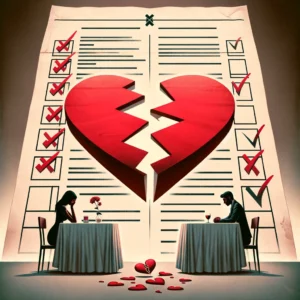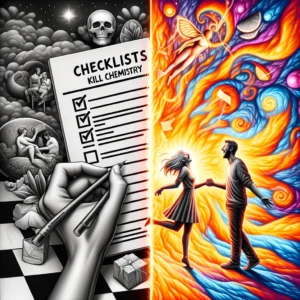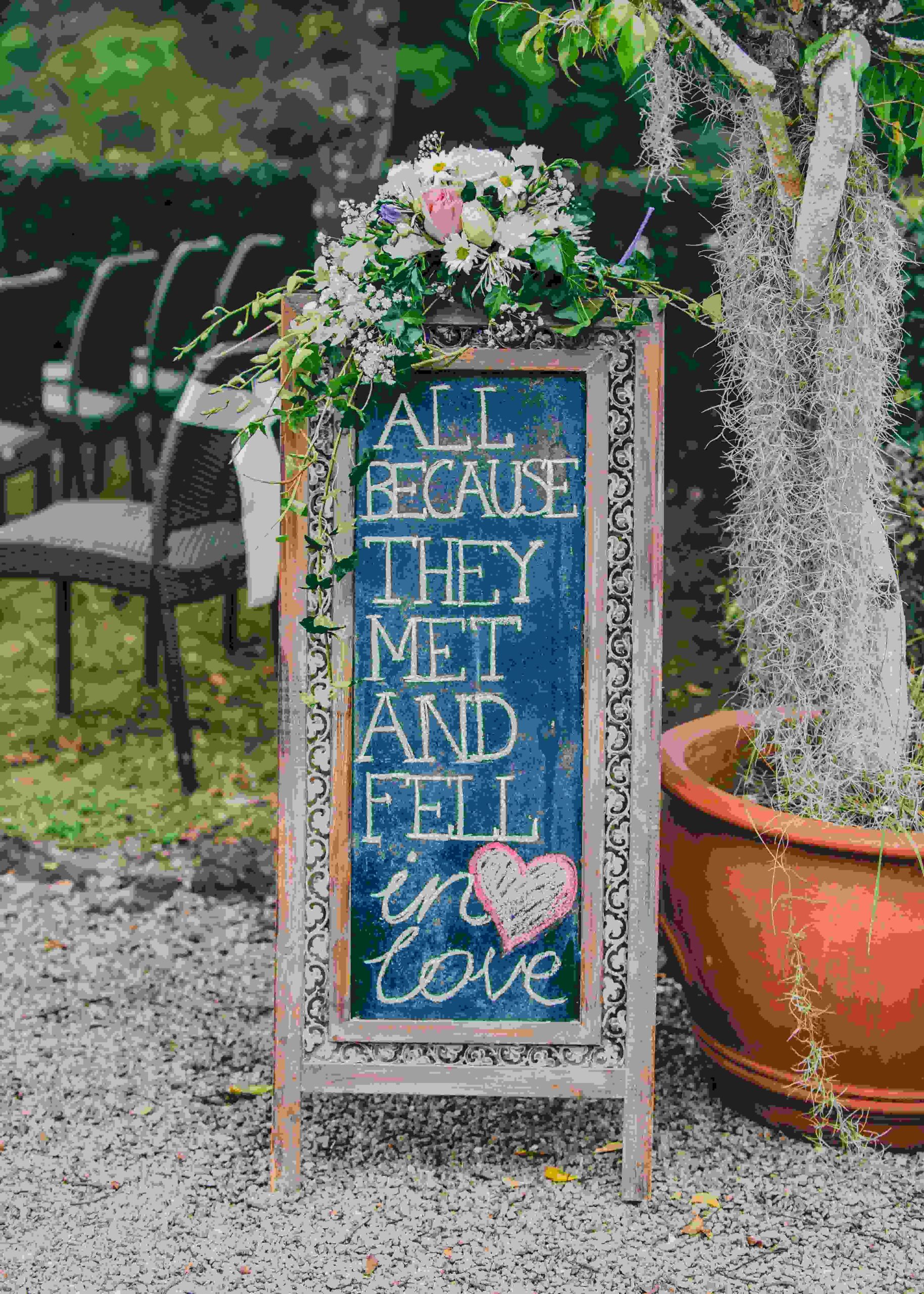OK, having some clarity around core values and relationship priorities can certainly be helpful. But taking this too far by crafting rigid checklists with dozens of specific demands can actually sabotage your dating success.
Why? Because it creates walls around your heart that bar entry to wonderful people who don’t tick every single box.
So while basic dating intentions are wise, a hyper-specific checklist is problematic.
In this article, I’ll share my insights on the danger behind a checklist for dating, and offer some healthier mindset shifts to embrace instead.
The Rise of Checklist Dating

Checklists seem pragmatic. In a world of endless options, they help narrow the field. You swipe left or right based on superficial compatibility. Boxes get checked or eliminated.
Online dating fuels this mentality. Platforms prompt you to filter on everything from height to food preferences. There’s nothing wrong with basic preferences, but taking it too far creates a “checklist culture.”
People proudly post their 10-page manifestos. Dating becomes less about human connection and more about analytical number-crunching.
The Problem with Checklists
Checklists sound great in theory. But in practice, they erect walls between you and potential partners. Here’s why they can sabotage dating success:
1. Checklists Kill Chemistry

Here’s a common scenario:
You meet your date. On paper, they check all your boxes – it should be a slam dunk!
But after five minutes, you feel no spark, no matter how perfect they seem on your checklist.
Why? Chemistry can’t be captured on paper. That instant connection depends on subtler energies impossible to codify in a list. There are no boxes for body language synchrony, scent, wit, warmth, or other ineffable qualities that determine attraction.
Yes, shared values matter. But you can’t checklist your way to chemistry. Open your mind and heart.
2. They Foster Rigidity, Not Discernment
Checklists often reflect rigid expectations, not actual relationship needs. My clients insist certain factors are absolute necessities. But when we dig deeper, these are merely inflexible preferences rather than core values.
Discernment means understanding your essence and loving in alignment with your spirit. Checklists, however, engender absolutist demands rather than actual needs.
For example, “must be 6 feet tall” is an arbitrary preference for many, not a true necessity. Let’s assess our checkmarks carefully.
3. They Objectify People
Treating dates like data sets dehumanizes the process. You seek to evaluate people against your standards. But checklists often reduce nuanced human beings to two-dimensional data points.
Imagine being seen not as a person but as a checklist to be approved or rejected. It’s demoralizing.
A better approach? Relate to your date as a complex individual. Instead of checking boxes, foster mutual understanding. You never know what wonderful things or important lessons someone might offer, even if they don’t match your checklist.
4. They Foster Entitlement
Checklists imply “I deserve this ultra-perfect partner without having to compromise or improve myself in any way.” But meaningful relationships require work: compromise, communication, self-knowledge.
Rather than assuming you’re owed your 100-item checklist, reflect on what you offer as a partner. Bring your best self to each encounter and invest in your own growth.
You may not find someone who meets your entire wishlist, but you might just discover the love of your life.
Healthy Discernment vs Rigid Checklists
Checklists aren’t inherently bad. The key is balancing healthy discernment with openness.
Here are a few principles for checklist-free dating:
Focus on Shared Values
Values and character matter more than superficial traits. Seek someone who shares your core beliefs but don’t get caught up in rigid preferences.
For example, focus on finding someone compassionate, honest, and loving rather than insisting on a specific income or pedigree.
Foster Understanding

Approach each encounter with openness: seek to understand who someone truly is. Don’t view them as a checklist.
Listen deeply and share vulnerably. Human connection requires moving beyond surfaces. Ditch preconceived expectations.
Stay Present
Rather than scanning for checklist marks, bring your full presence to each interaction. Engage your senses. Notice how you feel in their presence. Tune into subtler energetic and emotional cues instead of running down your list.
Lead with Warmth
Bring your most gracious and caring self. Project kindness and compassion, no matter how your date measures up to your standards.
You have a choice: find the good in each person or seek reasons to reject them. Foster uplifting connections that honor our shared humanity.
Focus on Learning
Treat each encounter as an opportunity to learn – about yourself, others, relationships, and love. You never know what wisdom someone might mirror back that helps you grow.
Let go of judgment. Even if someone isn’t “the one,” be grateful for the gifts and lessons exchanged.
Tips for Checklist-Free Dating

Ready to ditch the checklists and open yourself to love? Here are some tips:
Create a wish list, not a checklist. A wish list focuses on positive desires rather than rigid demands. For example: “I hope to find someone adventurous, caring, and financially stable.” This leaves room for possibilities without placing harsh pass-fail criteria.
Go with the flow. Don’t force conversations to check boxes. Let things unfold naturally and look for positive signals of chemistry and shared values. Tune into your intuition.
Don’t make snap judgments. Give people a chance before writing them off – you might uncover wonderful qualities beneath the surface. Remember, checklists capture surfaces, not subtler attributes.
Focus on learning and having fun! Take the pressure off needing to find “the one.” Enjoy learning about yourself and others. Curiosity and lightheartedness breed connection.
Practice self-reflection. Assess your own ways of thinking and relating so you bring your best self to encounters. Work on fears, blind spots, or judgmental attitudes that impede openness.
Know your core values, not just preferences. Dig deeper into your relationship needs and rank them. Then release superficial checklist items that don’t align with your heart’s wisdom.
Hold standards lightly. Remain open rather than shutting down at normal human imperfections. But also know when to walk away from truly misaligned values or red flags.
Give people a chance to surprise you! That means not writing them off just because they don’t check every box. You might just uncover an amazing human being.
Remember, one person won’t meet every need. Build a diverse community of supportive friends, family, and interests. Don’t put pressure on one relationship to fulfill your every desire.
The bottom line? Checklists seem pragmatic but often limit possibilities. Honor your values while remaining open to life’s wonderful surprises. Instead of demanding perfection, lead with warmth. Foster understanding, stay present, and enjoy the journey. When you do that, amazing people and possibilities will unfold.

